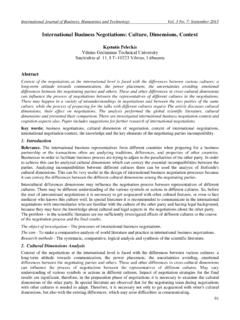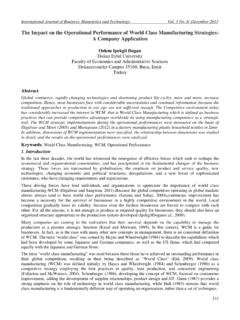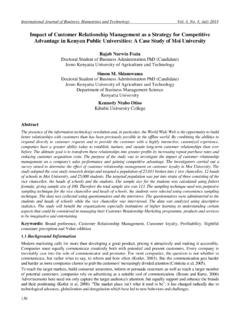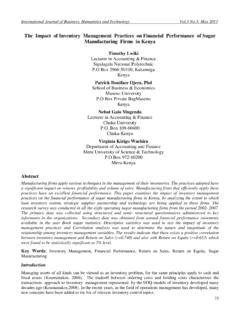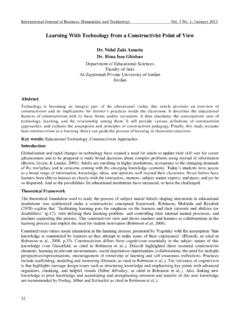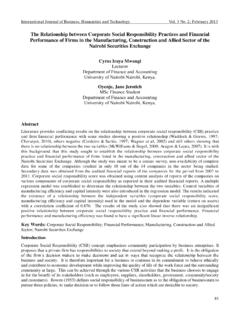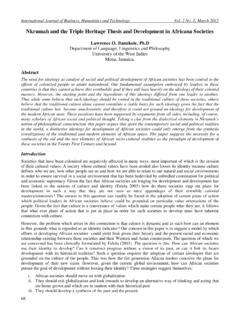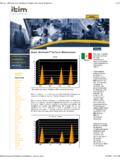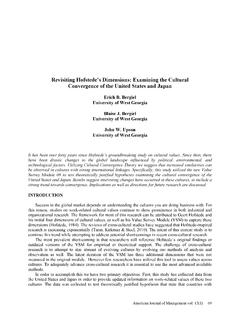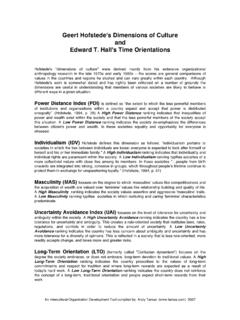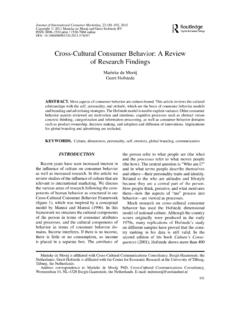Transcription of Cultural Values and Decision-Making in China - …
1 International Journal of Business, Humanities and Technology Vol. 3 No. 2; February 2013. Cultural Values and Decision-Making in China Durriya H. Z. Khairullah School of Business Saint Bonaventure University, Saint Bonaventure, NY 14778, USA. Zahid Y. Khairullah School of Business Saint Bonaventure University Saint Bonaventure, NY 14778, USA. Abstract The paper is based upon discussion and information provided by 22 senior managers at multinational corporations in China and published work related to doing business in China .
2 The five different Cultural dimensions of Hofstede and Hofstede and Bond schema and their implications particularly on the decision - making process by international managers are discussed. In addition the paper reviews and reinforces scholarly research on Chinese culture and business practices in China and in other countries. The findings of this paper together with those of previous studies could provide relevant information to managers who plan to do business in China . Key Words: China , Cultural Values , Hofstede s Cultural Dimensions, Decision-Making 1.
3 Introduction With the growth of globalization, Cultural sensitivity and understanding in dealing with global complexities involved in conducting business in host countries have been expanding (Sanyal, 2001). It is a known fact that culture varies across nations (Cateora, et al., 2011; Jain, 2001). Verhelst (1990, p. 17) defined culture as every aspect of life: knowhow, technical knowledge, customs of food and dress, mentality, Values , language, symbols, socio-political and economic behavior, indigenous methods of making decisions and exercising power, methods of production and economic relations, and so on.
4 Dutch management professor Hofstede (2001) refers to culture as the software of mind and argues that it provides a guide for humans on how to think and behave; it is a problem solving tool. Anthropologist and business consultant Hall (1959, p. 26 ) offers a definition of culture which is very relevant to international managers: The people we were advising kept bumping their heads against an invisible barrier . We knew that what they were up against was a completely different way of organizing life, of thinking, and of conceiving the underlying assumption about the family, and the state, the economic system, and even Man himself.
5 According to Ricks (1983) an essential skill for managing people and processes in other nations is Cultural savvy which is mangers having a working knowledge of the Cultural variables affecting management decisions. Joinson (1998) advocates Cultural sensitivity or Cultural empathy which is the recognition and sincerely caring about other peoples cultures. Cultural sensitivity calls for the ability of managers to understand the viewpoint of those living in very different cultures and the readiness to put them self in another peoples perspectives.
6 Furthermore, international managers can benefit tremendously from understanding the nature, dimension, and variables of a specific culture and how these affect work and organizational processes (Joinson, 1998). This Cultural awareness enables them to develop appropriate policies and determine how to plan, organize, and control in a specific international organization (Francesco and Gold, 2005; Hofstede, 1980; Joinson, 1998; Khatri, 2009). Very often managers have seriously overlooked the significance of Cultural factors and this lack of Cultural awareness has lead to blunders in international operations as reported in several publications ( Black and Mendenhall, 1990; Joinson, 1998.)
7 Podrug, 2011; Ricks, 1983; Wysocki, 1990). 1. Centre for Promoting Ideas, USA In essence, societies create their own cultures and organizational systems congruent with that culture (Ralston, et al., 1993). Therefore studying national cultures with the objective of understanding managerial Values and behaviors is imperative in international management research (Hofstede, 1980, 1991; Podrug, 2011). 2. Objectives of the Present Study The paper is based upon discussion and information provided by 22 senior managers (17 males and 5 females).
8 Employed at 15 multinational corporations in China . These included 10 Western, 4 Chinese and 1 Far East multinational companies. The main objective of this study is to discuss the Cultural Values in China in relation to the five different Cultural dimensions of Hofstede (1980) and Hofstede and Bond (1988) schema (hence forth called H&H/B dimensions) and their implications particularly on the process of Decision-Making by international managers. Although studies have appeared on the Cultural impact on various aspects of management in China ( , Albaum, et al.)
9 , 2010; Chinta and Capar, 2007; Conte and Novello, 2008; Deresky, 2003; Fan and Zigang, 2004; Glassman, 2011; Khatri, 2009; Laaksonen, 1984; Ralston, et al., 1997; Redding, 1990; Shenkar and Ronen 1987a, b) however studies on Decision-Making processes based on Hofstede s dimensions is marginal. The report is based on published literature; discussions and briefings provided by several senior level managers;. experiences; and observations in China as part of a University sponsored Faculty Development program. The study included both Chinese and western managers of multinational corporations operating in 4 cities of China .
10 Beijing, Shanghai, Suzhou, and Tianjin. In addition the paper reviews and reinforces scholarly research and publications on Chinese culture and business practices in China and other countries. The findings of this paper together with those of previous studies could provide relevant information to international managers who plan to do business in China and also further expand on the stream of research on China . 3. Background China : In the last fifteen years the economy, political, and social systems have undergone significant changes in the former Soviet Union, Eastern Europe, and China .
